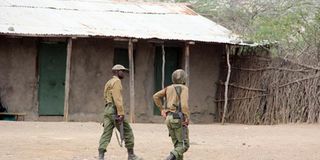To fight insecurity, we must change tack

Administration Police officers patrol Kapedo trading centre on the border of Baringo and Turkana counties on November 2, 2014. PHOTO | JARED NYATAYA |
What you need to know:
- To address insecurity, the focus must be on the causes, not the symptoms.
- The government must act firmly on those who incite others.
It is happening again. Policemen have been killed by marauding tribal militias, military barracks have come under attack, the public has lynched policemen on patrol — the list is endless.
The big question is: what is ailing security in this country?
The public is pointing an accusing finger at the security bosses. Is there any guarantee that if these men are replaced the situation will improve? Personally, I doubt it.
To address insecurity, the focus must be on the causes, not the symptoms.
In the past, we have addressed insecurity by adopting a reactive strategy, that is, replacing the head of police, increasing the number of police recruits without considering the welfare of the new officers, issuing ultimatums to the criminals, transferring policemen, and haphazard increase of the security budget.
The current security failure can be attributed to two main factors, namely societal and institutional. The former is the primary cause and the later is the secondary one.
Incitement by the local leadership under the guise of community rights has been a major contributing factor to persistent ethnic clashes and attacks on the police.
In cases of dispute over boundaries and resources, the approach has been to negotiate, in the process allowing local leaders to incite their communities under the pretext of freedom.
The end results is what is happening now.
The government must act firmly on those who incite others. As long as local leaders go unpunished for their inciting utterances, militia attacks in northern Kenya will continue.
RESTORE DEPLOYMENT
Military deployment in northern Kenya, which had been in place since independence, was recently stopped (to comply with the new Constitution). This must be restored.
Poorly equipped police in far-between posts do not have the capacity to deal with heavily armed tribal militias.
There is an urgent need to put in place a coordinated rapid response mechanism between the army and the police in order to promptly deal with militia attacks.
On institutional capacity, it is time we revised the training curriculum of the police and other paramilitary personnel.
Security agencies must have dedicated staff who are fairly recruited, well-trained, properly equipped, and well remunerated.
The courts recently nullified police recruitment on grounds of corruption and other malpractices.
This vindicated long-held suspicions among Kenyan that the recruitment is mired in nepotism and bribery.
As the government pumps more money into the security sector, it is equally important to enforce transparency and accountability.
The citizen’s role in maintaining security cannot be ignored. We must work with the security organs, especially in information-sharing.
Criminals do not live in isolation. It is not possible to address crime without sound intelligence collection. This can only be possible if the public works together with law enforcement agencies.
However, the police must first win the trust of the public. The Nyumba Kumi initiative should focus on educating the public.
Mr Mbarak is a retired military officer and security management professional. ([email protected])
Readers are invited to send their opinion and commentary articles to [email protected].





